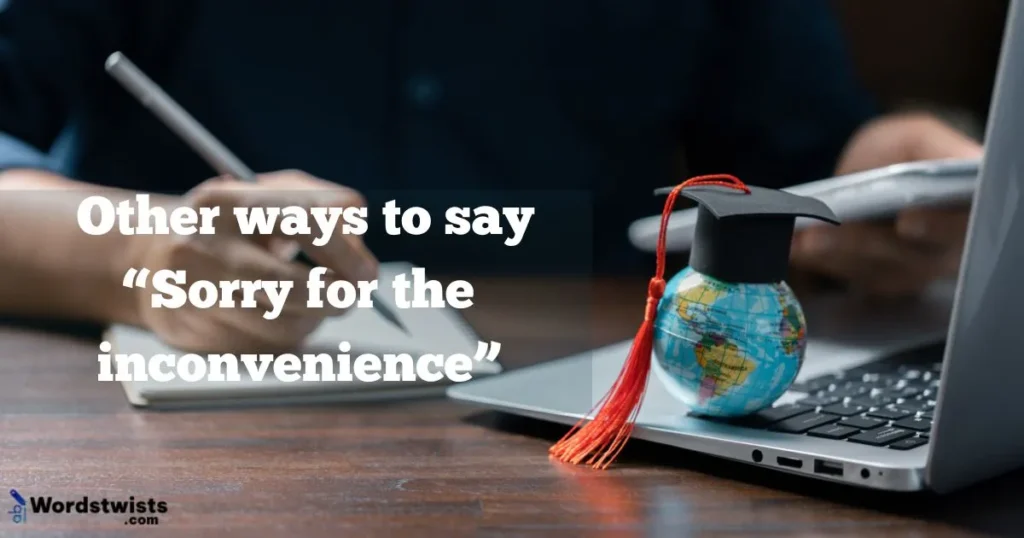I’ve been there—staring at my screen, typing yet another “sorry for the inconvenience” and feeling it fall flat. Overusing that same old phrase can make your customer communication feel robotic and dull. We all want our words to carry warmth, empathy, and authenticity, right? That’s why I’ve gathered 25 powerful apology alternatives—so you can ditch the cliché and inject real personality into your messages. Each option below is more precise and engaging, helping you express genuine regret, maintain a professional tone, and keep your audience feeling valued.
Ready to transform your writing? Scroll down to explore every alternative—each accompanied by a clear explanation, five impactful usage examples, and a quick note on why it works. Let’s level up your vocabulary and make your apologies stand out with style and sincerity!
Sorry for the Inconvenience Meaning
Sorry for the inconvenience is a polite expression used to show regret when your actions—or a situation—cause someone discomfort, delay, or frustration. It acknowledges the problem without making excuses and is often used in both personal and professional settings to maintain respect and empathy.
Alternatives to “Sorry for the Inconvenience Synonym”
1. I apologize for any trouble caused
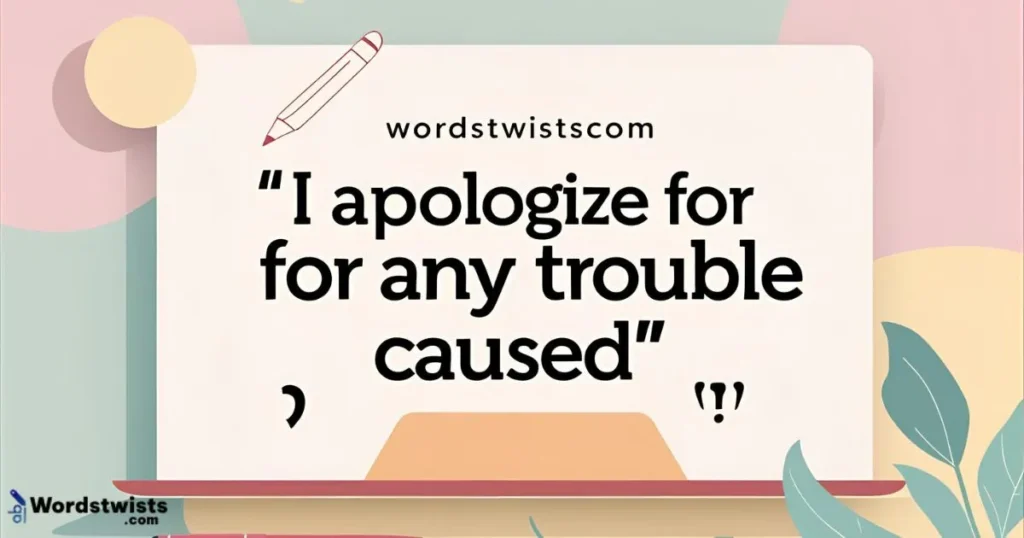
This phrase is a polished apology that acknowledges the recipient’s discomfort without overdoing it. It’s direct, professional, and shows you’re taking responsibility by clearly stating, we apologize for the inconvenience.
Usage Examples:
- “I apologize for any trouble caused by the late shipment.”
- “I apologize for any trouble caused in accessing your account.”
- “I apologize for any trouble caused by our maintenance work.”
- “I apologize for any trouble caused when we changed our schedule.”
- “I apologize for any trouble caused by the email glitch.”
Why it works: It’s concise yet sincere, striking a balance between formality and friendliness.
2. Thank you for your patience
Instead of saying sorry, you’re thanking the reader for bearing with you. This phrasing shifts the focus to their understanding, which feels more positive.
Usage Examples:
- “Thank you for your patience while we update your information.”
- “Thank you for your patience during our system upgrade.”
- “Thank you for your patience as we resolved the issue.”
- “Thank you for your patience while we investigated this error.”
- “Thank you for your patience as we worked to improve our service.”
Why it works: It shows gratitude, reinforcing a collaborative, customer-centric approach.
Read More: Other Ways to Say “You’re Hot” to a Guy
3. I regret any inconvenience
Using “regret” adds a touch of formality and depth to your apology. It’s perfect when you need to maintain a respectful tone.
Usage Examples:
- “I regret any inconvenience caused by the scheduling conflict.”
- “I regret any inconvenience experienced with your recent order.”
- “I regret any inconvenience due to the email delay.”
- “I regret any inconvenience resulting from our website maintenance.”
- “I regret any inconvenience stemming from the product recall.”
Why it works: The word “regret” conveys a genuine sense of remorse without sounding overly casual.
4. Please accept my apology
This classic phrase is polite and earnest. It directly invites forgiveness while showing humility.
Usage Examples:
- “Please accept my apology for the abrupt cancellation.”
- “Please accept my apology for the missing attachment.”
- “Please accept my apology for any confusion this caused.”
- “Please accept my apology for the error in your invoice.”
- “Please accept my apology for the oversight on our part.”
Why it works: It feels courteous and respectful, inviting a positive response.
5. My apologies for the disruption
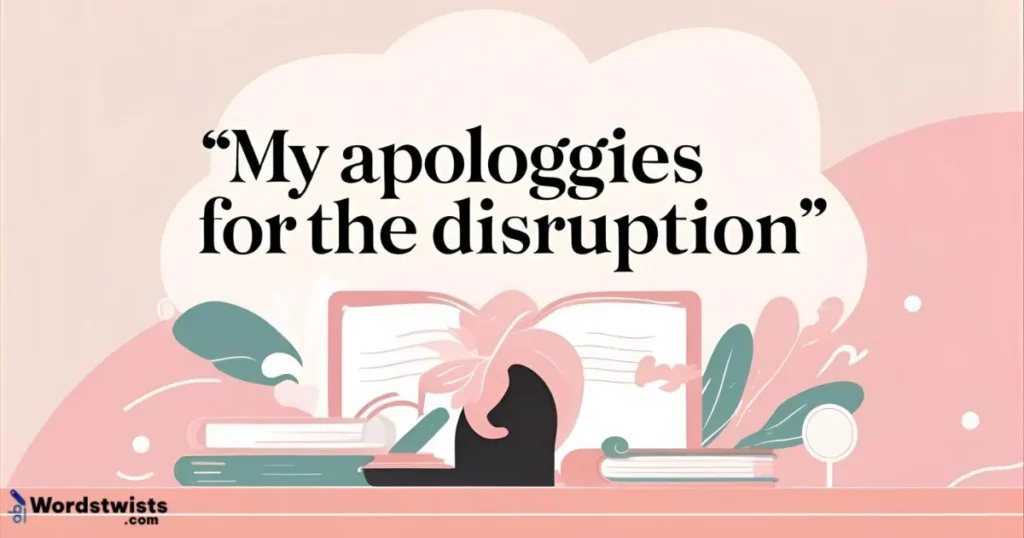
By using “my apologies,” you make the apology personal. Adding “disruption” pinpoints the issue, showing you’ve thought it through.
Usage Examples:
- “My apologies for the disruption during your call.”
- “My apologies for the disruption in service.”
- “My apologies for the disruption to your schedule.”
- “My apologies for the disruption caused by our renovation.”
- “My apologies for the disruption to your workflow.”
Why it works: It combines personalization (“my”) with clarity about the problem.
6. I appreciate your understanding
Expressing appreciation makes the reader feel valued. This phrase is warm and relational, perfect for less formal contexts.
Usage Examples:
- “I appreciate your understanding as we correct this mistake.”
- “I appreciate your understanding during our office move.”
- “I appreciate your understanding while we sort out the issue.”
- “I appreciate your understanding and will keep you updated.”
- “I appreciate your understanding and patience.”
Why it works: It emphasizes empathy, strengthening the reader’s goodwill.
Explore more: Other Ways to Say “To Whom It May Concern”
7. I regret the inconvenience
A shorter version of #3, this packs the same sincerity into a more streamlined format.
Usage Examples:
- “I regret the inconvenience this may cause.”
- “I regret the inconvenience during peak hours.”
- “I regret the inconvenience of rescheduling.”
- “I regret the inconvenience and will resolve it promptly.”
- “I regret the inconvenience and hope to make it right.”
Why it works: Its brevity keeps the message clear and focused.
8. I’m sorry for any hassle
Replacing “inconvenience” with “hassle” feels more casual and relatable, ideal for friendly communication.
Usage Examples:
- “I’m sorry for any hassle this update may cause.”
- “I’m sorry for any hassle with logging in.”
- “I’m sorry for any hassle during the installation.”
- “I’m sorry for any hassle in coordinating schedules.”
- “I’m sorry for any hassle this packing error created.”
Why it works: “Hassle” is everyday language, lowering the formality bar pleasantly.
9. Pardon the inconvenience
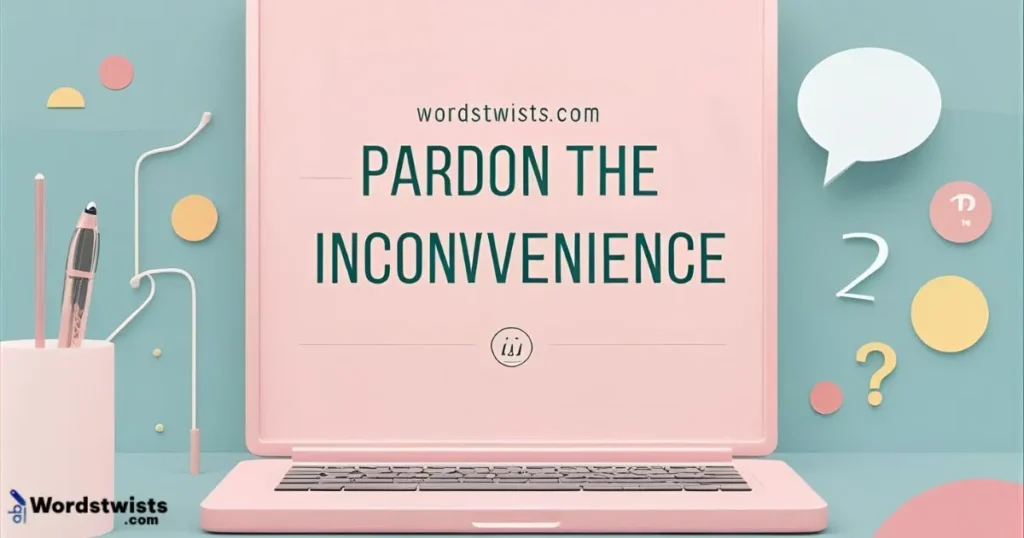
“Pardon” is a concise, slightly old-school alternative that feels charming and respectful.
Usage Examples:
- “Pardon the inconvenience while we upgrade our servers.”
- “Pardon the inconvenience during your visit.”
- “Pardon the inconvenience and thank you for sticking with us.”
- “Pardon the inconvenience as we implement these changes.”
- “Pardon the inconvenience caused by our limited hours.”
Why it works: It’s pithy and adds a dash of politeness.
10. I acknowledge the inconvenience
By “acknowledging,” you’re demonstrating awareness—a key component of sincere empathy.
Usage Examples:
- “I acknowledge the inconvenience this error created.”
- “I acknowledge the inconvenience and am working on it.”
- “I acknowledge the inconvenience of this delay.”
- “I acknowledge the inconvenience you’ve faced.”
- “I acknowledge the inconvenience and apologize sincerely.”
Why it works: It shows you’ve recognized the reader’s frustration, building trust.
See Also: Other Ways to Say “Stay Tuned”
11. I’m sorry for any trouble
This phrase adds a human element by using the word “trouble,” which feels more personal and down-to-earth than “inconvenience.”
Usage Examples:
- “I’m sorry for any trouble the delay may have caused.”
- “I’m sorry for any trouble with the download process.”
- “I’m sorry for any trouble reaching our customer service.”
- “I’m sorry for any trouble you’ve encountered using our app.”
- “I’m sorry for any trouble this confusion created.”
Why it works: It’s easy to understand and instantly relatable, making it ideal for conversational tone.
12. Thank you for bearing with us
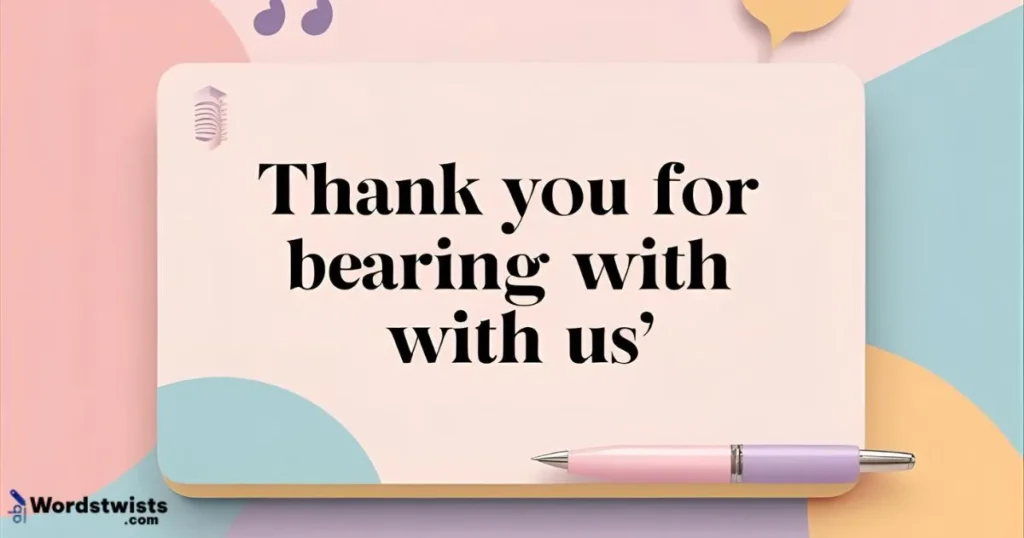
This phrase acknowledges the reader’s patience and frames the message in a positive light. It’s especially good when the issue has taken a while to resolve.
Usage Examples:
- “Thank you for bearing with us during the system outage.”
- “Thank you for bearing with us while we fix the issue.”
- “Thank you for bearing with us during the update process.”
- “Thank you for bearing with us through these delays.”
- “Thank you for bearing with us as we adjust to changes.”
Why it works: It builds rapport and feels like you’re speaking as a teammate, not a corporate robot.
Read More: Other Ways to Say “Happy to See You”
13. I understand this may be disruptive
Here, you’re showing emotional intelligence by recognizing how the situation may impact someone’s routine or work.
Usage Examples:
- “I understand this may be disruptive to your workflow.”
- “I understand this may be disruptive, and I apologize sincerely.”
- “I understand this may be disruptive, and I’m working quickly to fix it.”
- “I understand this may be disruptive during your busy schedule.”
- “I understand this may be disruptive and truly appreciate your patience.”
Why it works: It shows empathy, which strengthens trust and connection with your audience.
14. Excuse the inconvenience
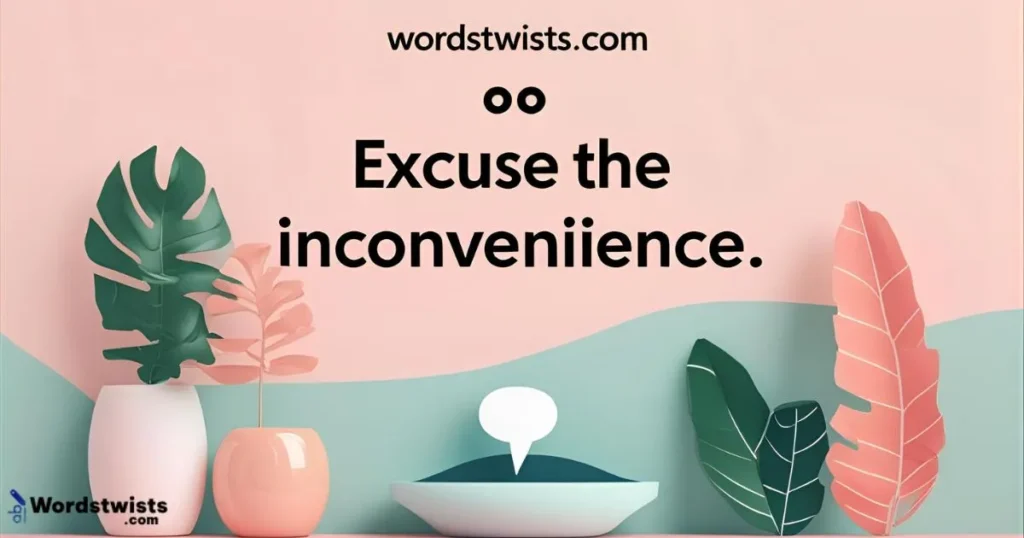
This short phrase feels friendly and respectful, making it suitable for both professional and casual contexts.
Usage Examples:
- “Excuse the inconvenience while we work behind the scenes.”
- “Excuse the inconvenience—our phone lines are currently full.”
- “Excuse the inconvenience caused by the login issue.”
- “Excuse the inconvenience, we’re almost back on track.”
- “Excuse the inconvenience and thank you for understanding.”
Why it works: It keeps the message brief, but courteous, which is ideal for fast communication.
15. I regret any trouble this may have caused
This is a more polished, slightly formal version of “I’m sorry,” and works well in business communication.
Usage Examples:
- “I regret any trouble this may have caused to your planning.”
- “I regret any trouble this may have caused in accessing the platform.”
- “I regret any trouble this may have caused your team.”
- “I regret any trouble this may have caused during your onboarding.”
- “I regret any trouble this may have caused with your subscription.”
Why it works: It shows maturity and accountability, which are vital in professional settings.
See Also: Other Ways toSay “I’m Happy For You”
16. I appreciate your patience
Much like #2, this version puts the focus on the reader’s virtue, making it feel more grateful than apologetic.
Usage Examples:
- “I appreciate your patience during our software update.”
- “I appreciate your patience as we address your concern.”
- “I appreciate your patience and support.”
- “I appreciate your patience while we finalize the process.”
- “I appreciate your patience while we verify your information.”
Why it works: It uses positive psychology, making people feel seen and respected.
17. I apologize for the disruption
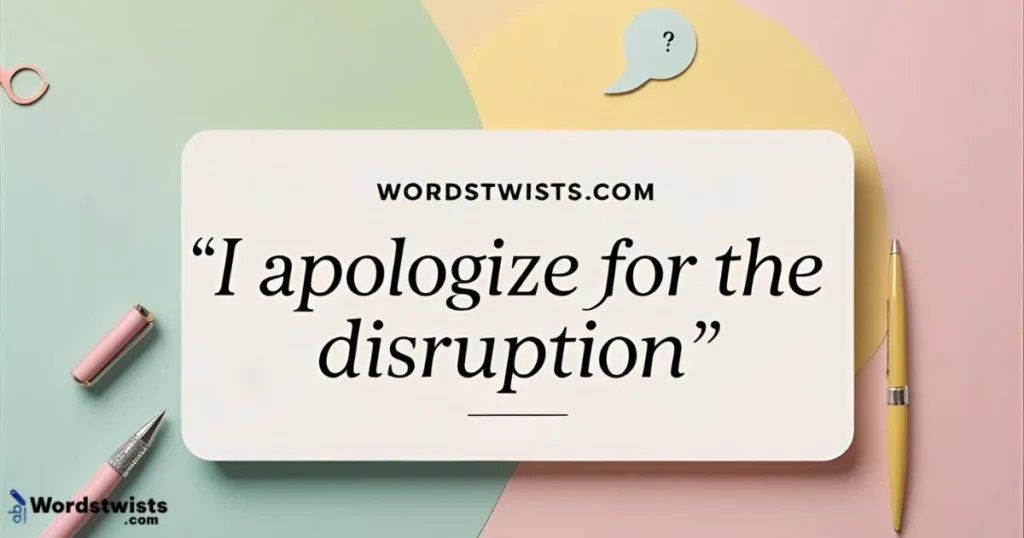
Disruption feels more real-world and tangible than the vague “inconvenience.” It’s great for service interruptions or workflow delays.
Usage Examples:
- “I apologize for the disruption in your daily routine.”
- “I apologize for the disruption to our schedule.”
- “I apologize for the disruption to your access.”
- “I apologize for the disruption caused by the maintenance.”
- “I apologize for the disruption in communications.”
Why it works: It uses specific language that feels more honest and precise.
Read More: Other Ways to Say “I Understand”
18. Sorry for the trouble
This is another conversational way to express regret without sounding stiff or overused.
Usage Examples:
- “Sorry for the trouble this might’ve caused.”
- “Sorry for the trouble with your invoice.”
- “Sorry for the trouble logging into your dashboard.”
- “Sorry for the trouble and confusion.”
- “Sorry for the trouble—this wasn’t our intent.”
Why it works: It’s short, sweet, and very human.
19. I regret the delay
When time is the issue, use this phrase to directly acknowledge it. It’s formal, clean, and to the point.
Usage Examples:
- “I regret the delay in responding to your message.”
- “I regret the delay in shipment.”
- “I regret the delay in resolving this matter.”
- “I regret the delay in confirming your reservation.”
- “I regret the delay and appreciate your patience.”
Why it works: It is specific and acknowledges the problem clearly, especially in professional scenarios.
20. My apologies for any delays
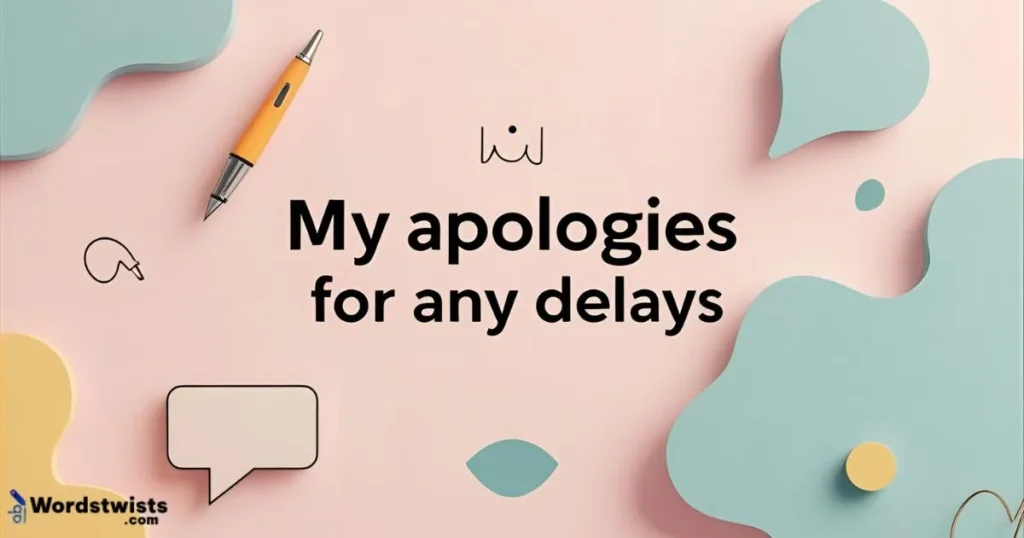
Another variation that sounds respectful and customer-focused. It adds a gentle tone.
Usage Examples:
- “My apologies for any delays in processing your request.”
- “My apologies for any delays in our response.”
- “My apologies for any delays in support.”
- “My apologies for any delays caused by high volume.”
- “My apologies for any delays during the system upgrade.”
Why it works: It’s versatile, and you can use it in both formal and semi-formal writing.
21. I’m sorry for the interruption
Use this when you’ve caused someone’s workflow or experience to be disrupted.
Usage Examples:
- “I’m sorry for the interruption during your session.”
- “I’m sorry for the interruption to your call.”
- “I’m sorry for the interruption caused by system maintenance.”
- “I’m sorry for the interruption in your services.”
- “I’m sorry for the interruption and thank you for staying with us.”
Why it works: It’s specific, polite, and shows that you understand the real-world impact.
Read More: Other Ways to Say “In Terms of”
22. Thank you for your continued patience
A slightly longer version of gratitude that works well for ongoing issues.
Usage Examples:
- “Thank you for your continued patience during our upgrade.”
- “Thank you for your continued patience while we troubleshoot.”
- “Thank you for your continued patience and understanding.”
- “Thank you for your continued patience as we improve our services.”
- “Thank you for your continued patience in this transition.”
Why it works: It adds a feeling of reliability and appreciation over time.
23. I apologize for any disruption
Another useful and flexible phrase, especially when talking to a professional audience.
Usage Examples:
- “I apologize for any disruption to your tasks.”
- “I apologize for any disruption this may have caused.”
- “I apologize for any disruption in services.”
- “I apologize for any disruption to your experience.”
- “I apologize for any disruption due to changes.”
Why it works: It’s neutral, versatile, and works across various industries.
24. Please pardon the delay
“Pardon” has an elegant, almost old-fashioned charm to it. Use it to soften the tone of an apology.
Usage Examples:
- “Please pardon the delay in our response.”
- “Please pardon the delay while we review your case.”
- “Please pardon the delay and rest assured we’re working on it.”
- “Please pardon the delay—there was a system backlog.”
- “Please pardon the delay in confirming your appointment.”
Why it works: It adds a graceful tone, especially when speaking to senior clients or in formal settings.
25. I regret the misstep
“Misstep” is a gentle way of saying something went wrong without sounding dramatic.
Usage Examples:
- “I regret the misstep in our handling of your case.”
- “I regret the misstep in your delivery process.”
- “I regret the misstep in how your request was handled.”
- “I regret the misstep and we’re making it right.”
- “I regret the misstep and apologize sincerely.”
Why it works: It shows honesty without over-apologizing, and it avoids repeating “inconvenience.”
26. I’m Sorry for the Inconvenience
This phrase feels personal and direct. It’s often used in one-on-one communication, where taking individual responsibility matters. It shows empathy and professionalism in a calm, respectful tone.
Usage Examples:
- “I’m sorry for the inconvenience, and I appreciate your patience.”
- “I’m sorry for the inconvenience—I’m working to fix it right away.”
- “I’m sorry for the inconvenience, and I’ll make sure it doesn’t happen again.”
- “I’m sorry for the inconvenience this delay has caused.”
- “I’m sorry for the inconvenience and truly value your understanding.”
Why it works:
It’s a simple, human way to show ownership. Saying “I” creates a personal connection and helps soften frustration.
27. We’re Sorry for the Inconvenience
This phrase reflects the voice of a team or company. It’s great for professional emails or official responses where responsibility is shared. It’s clear, calm, and conveys accountability.
Usage Examples:
- “We’re sorry for the inconvenience and appreciate your patience.”
- “We’re sorry for the inconvenience this has caused to your schedule.”
- “We’re sorry for the inconvenience—our team is already addressing it.”
- “We’re sorry for the inconvenience and thank you for bringing this to our attention.”
- “We’re sorry for the inconvenience and will ensure a smoother process next time.”
Why it works:
It reflects team accountability and a unified response, making it a strong option for brand or customer service messaging.
28. We’re Really Sorry for the Inconvenience
Adding “really” makes this version feel even more sincere and heartfelt. It’s useful when the issue is significant or when you want to emphasize deep regret.
Usage Examples:
- “We’re really sorry for the inconvenience this has caused.”
- “We’re really sorry for the inconvenience and are working to make things right.”
- “We’re really sorry for the inconvenience and truly value your trust.”
- “We’re really sorry for the inconvenience—this doesn’t reflect our usual standard.”
- “We’re really sorry for the inconvenience and thank you for your continued patience.”
Why it works:
This phrase goes a step further by amplifying empathy. It feels genuine, especially when the mistake affects someone in a meaningful way.
How to say sorry for the inconvenience?
You can say sorry for the inconvenience by expressing a polite and sincere apology, such as:
“We apologize for the inconvenience this may have caused,” or
“I’m sorry for any trouble this has caused you.”
key insight
How to apologize for any inconvenience?
To apologize for any inconvenience, acknowledge the impact clearly and show responsibility, for example:
“We sincerely apologize for any inconvenience and appreciate your understanding,” or
“Please accept our apologies for any disruption caused.”
How do you say sorry for the inconvenience in a professional way?
In a professional setting, use formal and respectful language like:
“We regret any inconvenience this may have caused and are committed to resolving the issue promptly,” or
“We apologize for the inconvenience and thank you for your patience.”
What can I say instead of “sorry for the inconvenience”?
Alternatives include:
- “We apologize for the disruption.”
- “Thank you for your understanding.”
- “We regret any trouble caused.”
- “Please accept our sincere apologies.”
- “We appreciate your patience during this time.”
Final Thoughts
Using creative and sincere alternatives to “sorry for the inconvenience” helps you sound more human, empathetic, and clear. Whether you’re crafting emails, texts, or support messages, these phrases will give your communication a fresh voice and strengthen your professional credibility. Don’t settle for overused phrases—stand out with words that show you care.
Try using one or more of these in your next message—and watch how much more warmly it lands.

I’m Leo Knox, the wordplay wizard behind WordsTwists.com where I turn everyday meanings into funny, clever, and creative twists. If you’re tired of saying things the boring way, I’ve got a better (and funnier) one for you!
